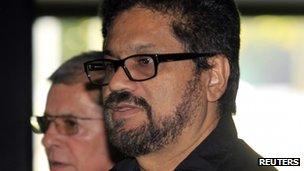Colombia Farc rebels blow up pylons after truce
- Published

Members of Colombia's largest guerrilla group, the Farc, say they blew up two electricity pylons on Tuesday because they had not been informed of a unilateral truce their leaders had declared at peace talks a day earlier.
They said the order to halt operations had not reached them in time.
They blamed the media for not reporting the truce more widely.
Farc leaders are currently holding peace talks with the Colombian government in Cuba.
'Incoherent'
Members of the 36th Front of the Farc said that the "electricity pylons were blown up in Reposo, municipality of Campamento, on 20 November because the order to cease fire had not reached the guerrilla unit involved in that action".
"There was not enough media coverage of the Farc spokespeople ordering the ceasefire, so that all guerrilla units could have heard it," the statement read.
On Monday 19 November, Farc lead negotiator Ivan Marquez announced in Cuba that the rebels would halt all attacks from midnight on the same day until 20 January 2013.
He said it was "a contribution made to strengthen the climate of understanding necessary so that the parties that are starting the dialogue achieve the purpose desired by all Colombians.
Colombia's Minister of Defence Juan Carlos Pinzon has rejected the temporary truce, calling it "incoherent".
The negotiations in Havana are held behind closed doors, but the two teams said before the talks started that they would focus initially on the issue of land reform in Colombia.
Four other points will be discussed: the end of armed conflict; guarantees for the exercise of political opposition and citizen participation; drug trafficking; and the rights of the victims of the conflict.
- Published24 November 2012
- Published19 November 2012
- Published18 October 2012